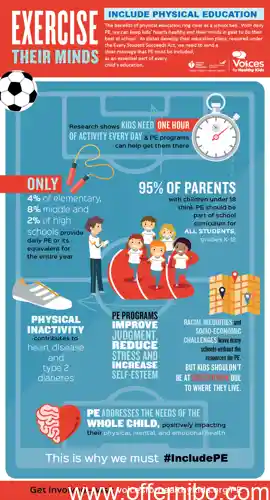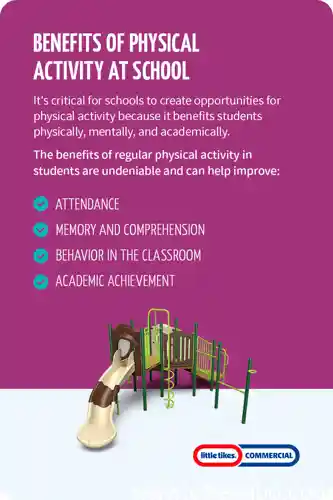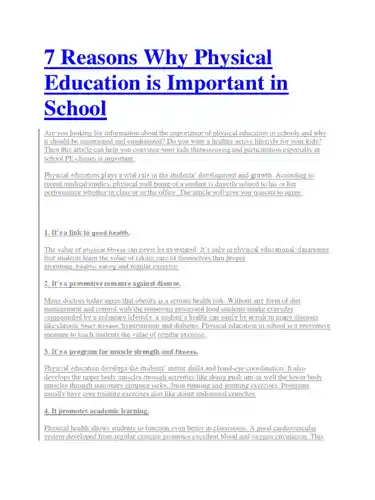As we navigate the complexities of today’s world, it becomes increasingly apparent that physical education (PE) should be an indispensable component of every school curriculum. Its profound impact extends far beyond physical prowess, enriching the lives of young individuals in myriad ways.From a physical standpoint, PE provides a vital platform for children and adolescents to develop their motor skills, fitness levels, and overall health. By engaging in various physical activities, students enhance their coordination, balance, and cardiovascular endurance, laying the foundation for a healthy and active lifestyle. Furthermore, PE classes serve as a crucial avenue for addressing childhood obesity, a growing concern in our society. Physical activity helps regulate weight, reduces body fat, and promotes the development of strong bones and muscles.Beyond physical health, PE also nurtures cognitive and behavioral growth. Studies have consistently demonstrated that regular physical activity improves memory, concentration, and decision-making abilities. By challenging students both physically and mentally, PE enhances their overall cognitive function, preparing them for academic success and lifelong learning. Additionally, PE fosters collaboration, communication, and empathy, enabling students to develop strong social skills and positive relationships with their peers.In an era marked by technology and sedentary lifestyles, the importance of PE cannot be overstated. It provides children and adolescents with the essential opportunity to move their bodies, engage their minds, and connect with others. By investing in mandatory physical education in schools, we are investing in the health, well-being, and future success of our young people.
Why Mandatory Physical Education in Schools: A Comprehensive Examination

In a world where technology and sedentary lifestyles reign supreme, why should physical education be mandatory in schools? This question deserves our undivided attention, as the benefits of physical education extend far beyond mere physical fitness. Mandatory physical education empowers students with the tools they need to navigate life’s challenges, both inside and outside the classroom. Physical activity, as an integral part of a holistic education, is not solely about building strong bodies but also about fostering cognitive development, promoting social inclusivity, and addressing prevalent health concerns. By embracing mandatory physical education, we unlock a world of opportunities for students to thrive and reach their full potential.
Physical Health Benefits and Development: Unlocking the Power of PE

Physical Education (PE) in schools is of paramount importance for our children’s well-being and should be made mandatory. Engaging in regular physical activity has a multitude of benefits for their physical health and development. Exercise helps improve motor skills, enhances coordination and balance, and builds muscle strength. It also promotes cardiorespiratory fitness, leading to improved endurance, stamina, and overall cardiovascular health. Furthermore, PE contributes to healthy bone development, reducing the risk of osteoporosis and fractures. By incorporating PE into the school curriculum, we can lay the foundation for lifelong healthy habits and empower our children to make informed choices about their physical well-being.
Exploring the Physical Advantages: Improved Motor Skills, Fitness Levels, and Overall Health
Physical education (PE) in schools is not just about games and sports; it’s an investment in your child’s overall well-being. By providing structured physical activity, PE classes help children develop their motor skills, improve their fitness levels, and establish healthy habits that can last a lifetime. Regular physical activity strengthens muscles and bones, reduces the risk of chronic diseases like obesity, heart disease, and diabetes, and improves overall physical health. PE classes also provide a safe and supportive environment where children can learn about different sports and activities, develop a sense of teamwork, and build confidence in their physical abilities.
Cognitive and Behavioral Enhancements: The Hidden Benefits of Physical Activity

Physical education isn’t just about getting kids moving; it’s also about nurturing their minds and behaviors. Studies have shown that regular physical activity can enhance cognitive function, improve memory, boost concentration, and sharpen decision-making abilities. Physical activity increases blood flow to the brain, delivering oxygen and nutrients that are essential for optimal cognitive performance. Exercise also stimulates the release of neurotransmitters like dopamine and serotonin, which play a crucial role in mood regulation, motivation, and learning. By incorporating physical education into school curricula, we can not only promote physical health but also unlock the hidden potential of our students’ minds.
Fostering Cognitive Skills: Improved Memory, Concentration, and Decision-Making
Have you ever noticed how easy it is to focus after a brisk walk or an invigorating workout? Physical activity doesn’t just benefit your physical health; it also works wonders for your cognitive abilities. Research suggests that engaging in regular physical education can enhance memory, concentration, and decision-making skills. Just as exercise strengthens your muscles, it also strengthens the neural pathways in your brain, making it more efficient at processing information and solving problems. So, not only will you feel physically fit, but you’ll also be mentally sharp and ready to tackle any challenge that comes your way. Physical education isn’t just about jumping jacks and dodgeball; it’s about empowering you with the tools to succeed not just on the field but in life.
Social Development and Inclusivity: Building Connections through Physical Education

Physical Education (PE) plays a pivotal role in shaping not only our physical well-being but also our social development. By engaging in various physical activities, children and adolescents learn essential social skills such as teamwork, cooperation, and conflict resolution. PE classes foster a sense of camaraderie and inclusivity, breaking down barriers and creating a positive and supportive environment for all students. Through shared experiences and challenges, students develop empathy, learn to respect differences, and appreciate the value of diversity. PE becomes a melting pot where students from all backgrounds come together to pursue a common goal, promoting a sense of belonging and community. It is in these shared spaces that the foundation for lifelong social connections is laid.
Encouraging Teamwork and Collaboration: Promoting Social Skills and Inclusivity
Picture this: a sea of smiling faces, working together towards a common goal, celebrating their collective success. This is the power of physical education in schools, a vital force for fostering social development and inclusivity. Physical activity provides a shared space where students from all backgrounds can connect, learn from one another, and build lasting friendships. It’s not just about winning or losing, but about the journey and the relationships forged along the way. By engaging in team sports, students develop essential social skills like communication, cooperation, and empathy. They learn to value teamwork, appreciate diversity, and embrace the strengths of each individual. Physical education becomes a microcosm of society, teaching students the importance of working together, respecting differences, and striving towards a common goal. It’s a valuable lesson that extends far beyond the classroom, shaping our future citizens into empathetic and inclusive members of our communities.
Addressing Health Challenges: Physical Education as a Tool for Prevention and Treatment
Physical education (PE) is not just about playing games and getting sweaty; it’s about equipping you with the tools to live a long, healthy, and fulfilling life. By incorporating PE into your school curriculum, you’re not only investing in your physical well-being but also in your cognitive, social, and emotional development. Physical activity has been scientifically proven to improve your cardiovascular health, strengthen your muscles and bones, and boost your energy levels. Moreover, it helps you maintain a healthy weight, reducing your risk of chronic diseases such as obesity, heart disease, and type 2 diabetes.
Combating Childhood Obesity and Promoting Healthy Habits: The Role of Physical Education
Physical education can emerge as a beacon of hope for combating childhood obesity, a grave health challenge facing our youth today. Overweight and obesity affect nearly one in five children in the United States, increasing their risk of developing chronic diseases later in life, including heart disease, stroke, and type 2 diabetes. By integrating physical education into the school curriculum, we empower students with the knowledge, skills, and confidence to make healthy lifestyle choices. Regular physical activity fosters a lifelong love of exercise, setting children on a path toward optimal physical and mental well-being. Additionally, physical education provides a platform to promote healthy habits, such as balanced nutrition and adequate sleep, which are crucial for maintaining a healthy weight and overall well-being.
Q1. Why should physical education be mandatory in schools?
Ans: Physical education helps students develop physical literacy, motor skills, and lifelong fitness habits.
Q2. What are the benefits of physical education in schools?
Ans: Physical education improves physical health, mental well-being, and academic performance.
Q3. How does physical education contribute to academic success?
Ans: Physical activity improves cognitive function, focus, and attention span, which are essential for academic success.
Q4. Why is physical education essential for students’ overall development?
Ans: Physical education promotes physical, social, emotional, and cognitive development, contributing to students’ overall well-being.
Q5. How does physical education address childhood obesity and inactivity?
Ans: Physical education provides regular opportunities for students to engage in physical activity, reducing their risk of obesity and promoting healthy habits.
Q6. What are the long-term implications of mandatory physical education in schools?
Ans: Mandatory physical education fosters lifelong physical activity habits, reducing the risk of chronic diseases and improving overall health outcomes.